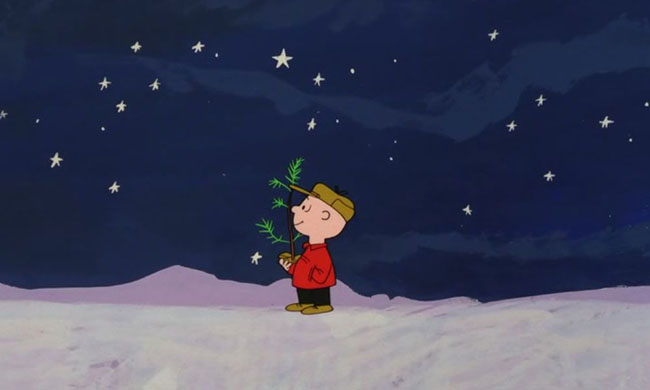‘What is Christmas all about?’ asks Charlie Brown, in Charles Schultz’s Charlie Brown’s Christmas.
When Charlie Brown’s Christmas was first released (December 1965), the overwhelming positive response took the television network executives by surprise. It was watched by forty-five percent of the television viewing audience that night. And every year since 1965 it has continued to draw millions.
Tired of the commercialism of Christmas, Charlie Brown wants to know its real meaning. We see Snoopy’s answer when he enters a Christmas lighting and decoration competition. For Sally, Charlie Brown’s young sister, it’s all about getting.
When once again Charlie Brown asks his question, Linus responds by taking center-stage and reading from Luke 2:8-14:
And there were in the same country shepherds abiding in the field, keeping watch over their flock by night. And, lo, the angel of the Lord came upon them, and the glory of the Lord shone round about them: and they were sore afraid. And the angel said unto them, Fear not: for, behold, I bring you good tidings of great joy, which shall be to all people. For unto you is born this day in the city of David a Savior, which is Christ the Lord. And this shall be a sign unto you; Ye shall find the babe wrapped in swaddling clothes, lying in a manger. And suddenly there was with the angel a multitude of the heavenly host praising God, and saying, “Glory to God in the highest, and on earth peace, good will toward men” (KJV).
In an interview, Jeannie Schultz commented that her husband pushed back against the idea that there is no place for a Bible text in a cartoon. Schultz insisted that the Bible is not just for church – it is for everyone.
GIVING AND GETTING
Charles M. Schultz understood that Christmas is the twinning of Giving and Getting. God gave. We get, or receive.
Indeed, during this season of Advent season we have noted that back in the 8th century BC, Isaiah foretold that a young woman would conceive and give birth to a son who would be named, Immanuel – God with us (Isaiah 7:14).
But that was not all. In Isaiah 9:1 we read that into the darkness of Israel’s experience, a light would dawn in the north, in the region of Galilee: Nevertheless, there will be no more gloom for those who are in distress.
Galilee was the region that had been subject to the Assyrian invasion. As Isaiah 9 unfolds we read there would be joy (9:3); the signs of war would cease (9:4-5); and the shadow of death would disappear. For, as Isaiah 9:6 says, To us a child is born, to us a son is given…
The sign of God’s victory would begin with something weak and insignificant – the birth of a baby. Yet, the government will be on his shoulders. His name was to be called, wonderful counsellor, mighty God, everlasting Father, Prince of Peace (9:6).
Through the lens of the New Testament we see these words being fulfilled – not completely, but the first installment. Matthew 1:21-23 records the words of the angel to Joseph: “(Mary) will bear a son, and you shall call his name Jesus, for he will save his people from their sins.” All this took place to fulfill what the Lord had spoken by the prophet: “Behold a virgin shall conceive and bear a son, and they shall call his name Immanuel”.
So often we simply do not appreciate the full weight of this event. We may believe the baby born in Bethlehem to be the Son of God, but too often we let the intense meaning of this birth pass us by.
How often do we pause and reflect on the reality that divinity walked the streets of Jerusalem? That infinite Wisdom and Power humbly took on human nature? That God poured his heavenly resources into rescuing us, even though it meant the violence and the horror of a crucifixion?
It is for our sake that Christ condescended to such monumental humiliation. The lowly birth in Bethlehem points to Christ’s voluntary decision to set aside his glory for our sake. He came and he gave, to enrich us.
Because of God’s gift to us, we will want to respond with repentance and deep thanks. We will also want to emulate, no matter how feebly, the unspeakable generosity of his gift. Because God gave, we will want to live God’s way and to share with others the gift of joy and hope. Not condescendingly or aggressively, but graciously and generously.
Indeed, you may want to watch Charlie Brown’s Christmas with family or friends. You may also want to give a special Christmas gift for the work of the gospel through your church or a gospel network such as the Anglican Connection. (Please email me for more information.)
© John G. Mason


